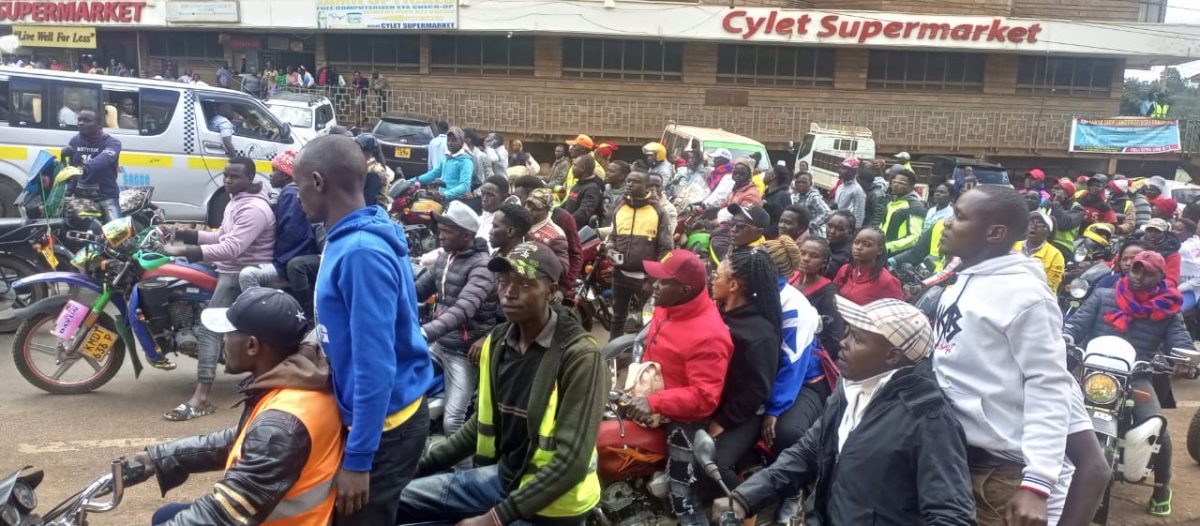Riding with blame: The silent toll of stigma on boda boda operators

Bodaboda operators in Kenya have long been painted in a negative light, often associated with lawlessness, indiscipline, and now, crime.
In recent times, they have been branded as accomplices in phone and handbag snatching incidents, most of which occur with the perpetrators riding boda bodas.
While many riders are guilty only by association, public sentiment—especially on social media—has cast a shadow of mistrust, portraying them as dangerous and untrustworthy. This especially after follows recent incidents with associated with politicians as people on motorbikes invaded crowds.
In Eastleigh, a densely populated commercial hub in Nairobi, the growing stigma is not just damaging reputations—it’s crippling livelihoods. Operators here say they are bearing the brunt of crimes committed by passengers posing as ordinary clients. With more than half a million residents and constant business activity, Eastleigh has high demand for quick transport, but many now shy away from boda bodas for fear of theft.
Moses Wakalu, a seasoned rider in the area, shares his frustration. He explains that most riders have no idea their passengers are plotting theft.
I’m focused on the road
“When I carry someone, I see a client, not a criminal. I’m working. But some of these passengers know exactly what to do and when to strike,” he says. Wakalu recalls incidents where thieves have grabbed valuables mid-ride, leaving him unaware of what happened until angry victims scream accusations. “I wear a helmet and I’m focused on the road. I don’t see what’s happening behind me,” he adds.
He says many riders are wrongfully arrested or blamed, even when they were unwitting accomplices. “We get treated like criminals, lose customers, and go home empty-handed,” Wakalu laments.
Martin Wanju, another rider, says they now rely on a small circle of regular clients who still trust them. “New customers don’t want to use us. They prefer apps like Uber and Bolt. They think we’re not safe,” he says. Wanju admits a few rogue riders might be part of theft rings, but insists the wider community of bodaboda operators is suffering unfairly.
Customers opt for formal courier
This suspicion extends to delivery services. Riders are increasingly turned away by shop owners and clients who refuse to engage with them.
“We are left standing outside like suspects,” says Wanju.
As trust erodes, customers are opting for formal courier services, eating into the riders’ income.In addition to public mistrust, the riders say they face daily harassment from police. According to Samuel Isaac, officers arrest them arbitrarily, impound their bikes, and demand hefty bribes for release.
“They don’t care who’s guilty. You just get arrested, and to get your bike back, you must pay,” he says, noting bribe demands range from Sh5,000 upwards. Most riders end up using all their earnings or borrowing money to recover their bikes, sinking deeper into financial strain.
As Eastleigh’s economy thrives, its bodaboda operators are struggling to keep up—not for lack of demand, but because of fear, stigma, and systemic challenges. Many now worry that if mistrust and harassment persist, they’ll lose not only their jobs but their place in a fast-changing community.
Rise of platform-based commerce
On average, these riders generate about Sh1,100 daily, amounting to more than Sh316,000 annually — and without the drain of daily rental payments which are estimated at SH300 for those who do not own broads bodies, but can retain more of what they earn.
As the country pursues inclusive growth and youth empowerment, enabling boda boda operators to build assets supports both personal and national development will be key in having a good relationship with people and other sectors of the economy.
The sector’s integration into agriculture, logistics, health, and education illustrates its utility beyond transport — it is a lifeline connecting goods and services across the country.
Furthermore, as Kenya’s digital economy grows, so does the demand for last-mile delivery. Boda boda riders will be central to the rise of platform-based commerce, with the Competition Authority projecting nearly 20 per cent growth in the delivery market by 2027.












